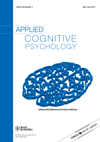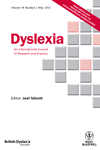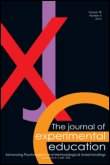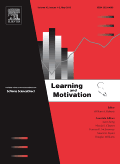
Metacognition and Learning
Scope & Guideline
Fostering Innovation in Education and Cognitive Psychology
Introduction
Aims and Scopes
- Metacognitive Awareness and Regulation:
Exploration of how individuals can monitor and control their cognitive processes during learning, including the development of tools and strategies to enhance metacognitive skills. - Self-Regulated Learning (SRL):
Research on self-regulated learning strategies, including how learners can effectively manage their learning processes, set goals, and reflect on their performance. - Educational Interventions:
Evaluation of educational programs and interventions designed to improve metacognitive skills and self-regulated learning among various learner populations, from elementary to higher education. - Cognitive and Emotional Factors:
Investigating the interplay between cognitive processes and emotional factors in learning, including how emotions influence metacognitive judgments and learning outcomes. - Cross-Disciplinary Approaches:
Integration of insights from psychology, education, and cognitive science to inform practices and theories surrounding metacognition and learning.
Trending and Emerging
- Multimodal Data Analysis:
Increasing use of multimodal data to analyze metacognitive processes, particularly in complex learning environments like medical training, suggesting a trend towards more sophisticated research methodologies. - Integration of Emotional and Motivational Factors:
An emerging emphasis on how emotional and motivational aspects influence metacognitive processes and self-regulated learning, indicating a holistic approach to understanding learning. - Educational Technology and Online Learning:
A rising interest in the role of technology and online learning environments in facilitating metacognitive skills, reflecting the growing relevance of digital education. - Cultural and Contextual Variability:
Research focusing on cultural and contextual differences in metacognitive awareness and strategies, highlighting the importance of diverse educational settings. - Longitudinal Studies:
A trend towards longitudinal studies examining the development of metacognitive skills over time, providing insights into how these skills evolve and impact learning outcomes.
Declining or Waning
- Traditional Assessment Methods:
Research focusing on traditional assessment techniques for measuring metacognition has seen a decline, as newer methodologies and technologies for assessing metacognitive awareness emerge. - Basic Metacognitive Processes:
There seems to be a waning interest in the fundamental aspects of metacognitive processes, as the journal shifts toward more complex interactions between metacognition, emotional factors, and learning environments. - Generalized Metacognitive Strategies:
The focus on broad, generalized strategies for metacognition is decreasing in favor of more nuanced, context-specific strategies that consider individual differences and situational factors.
Similar Journals

EUROPEAN JOURNAL OF PSYCHOLOGY OF EDUCATION
Transforming educational landscapes through psychological insights.Welcome to the European Journal of Psychology of Education, a leading scholarly publication dedicated to advancing the fields of developmental and educational psychology. Published by Springer, this esteemed journal boasts an impressive impact factor, firmly placing it in the Q1 quartile for both Developmental and Educational Psychology as well as Education as of 2023. With a Scopus rank of #171 out of 1543 in Social Sciences Education and a #63 ranking out of 360 in Psychology, it represents a vital resource for researchers, professionals, and students seeking to explore innovative educational practices and psychological theories from a European perspective. Founded in 1986, the journal has established itself as a cornerstone of contemporary research over the years and continues to publish high-quality articles that contribute significantly to the understanding of psychological principles in educational contexts. Although it does not currently operate under an open access model, its rigorous peer-review process ensures that only the most impactful studies are included, making it essential reading for those committed to advancing educational psychology.

APPLIED COGNITIVE PSYCHOLOGY
Enhancing Lives Through Applied Cognitive DiscoveriesApplied Cognitive Psychology, published by Wiley, is a premier academic journal dedicated to the innovative exploration of cognitive psychology and its applications in real-world contexts. With an ISSN of 0888-4080 and an E-ISSN of 1099-0720, this esteemed publication has been at the forefront of its field since its inception in 1987. The journal holds a remarkable Q1 ranking in Arts and Humanities (miscellaneous), alongside significant positions in developmental and educational psychology as well as experimental and cognitive psychology, reflecting its influential role in advancing knowledge and practices. Although it does not offer open access options, Applied Cognitive Psychology remains a vital resource for researchers, professionals, and students seeking to deepen their understanding of cognitive processes and their implications across various domains. By effectively bridging theoretical insights with practical applications, the journal plays an essential role in fostering dialogue within the scientific community and contributes to ongoing advancements in the field.

EDUCATIONAL TECHNOLOGY & SOCIETY
Bridging Technology and Society for Enhanced Learning ExperiencesEDUCATIONAL TECHNOLOGY & SOCIETY is a prestigious, peer-reviewed journal dedicated to advancing the fields of educational technology and its societal implications. Published by the International Forum on Educational Technology and Society at National Taiwan Normal University, this journal has established itself as a transformative platform for research and innovation in education, e-learning, and engineering. With a commendable impact factor reflected in its Q1 quartile rankings across multiple categories, including Education and Sociology, this journal is recognized for its rigorous scholarship and impactful contributions, ranking in the top percentiles within its respective fields. Since its transition to Open Access in 1998, EDUCATIONAL TECHNOLOGY & SOCIETY has provided an invaluable resource for researchers, educators, and policymakers, facilitating the dissemination of cutting-edge research that drives progress in educational practices globally. Whether you are a seasoned researcher or a dedicated student, this journal fosters a vibrant academic community committed to exploring innovative approaches in educational technology.

International Journal of School & Educational Psychology
Unveiling New Perspectives in School and Educational PsychologyThe International Journal of School & Educational Psychology, published by Taylor & Francis Ltd, is a premier academic journal dedicated to advancing the fields of educational and developmental psychology. With an ISSN of 2168-3603 and E-ISSN 2168-3611, the journal has been a valuable resource since its establishment in 2013, with contributions to the field continuing through 2024. The journal's commitment to rigorous research is evident in its Q2 ranking in both Developmental and Educational Psychology and Education categories in 2023, as well as its notable Scopus rankings, placing it in the top 25% of educational journals. Although it does not offer open access options, the journal provides an essential platform for disseminating high-quality research that enriches the understanding of psychological principles in educational contexts. Targeting researchers, professionals, and students alike, the International Journal of School & Educational Psychology strives to highlight innovative methodologies, practical applications, and theoretical discussions that shape educational practices and foster optimal learning environments.

DYSLEXIA
Illuminating pathways to learning success.DYSLEXIA is a premier international journal published by WILEY, dedicated to advancing the understanding of dyslexia and related learning difficulties through high-quality, peer-reviewed research. With its ISSN 1076-9242 and E-ISSN 1099-0909, the journal has established itself as a crucial platform for researchers and practitioners in the fields of developmental and educational psychology, education, and experimental and cognitive psychology, achieving a commendable Q2 ranking across multiple categories in 2023. Designed to bridge the gap between research findings and practical applications, DYSLEXIA publishes articles that offer insights into the underlying mechanisms of dyslexia, intervention strategies, and policy implications, thereby fostering a multidisciplinary approach within the academic community. The journal caters to a global audience and addresses a wide range of topics essential for educators, clinicians, and researchers, ensuring that it remains a vital resource in fostering knowledge and understanding of dyslexia. With converged years of expertise spanning from 1996 to 2024, DYSLEXIA continues to play an influential role in minimising the impact of this learning difficulty on individuals’ educational trajectories and life outcomes.

JOURNAL OF EXPERIMENTAL EDUCATION
Pioneering insights for a brighter educational future.Journal of Experimental Education, published by Routledge Journals, Taylor & Francis Ltd, is a prestigious platform dedicated to advancing the field of educational research. With an impressive history spanning from 1932 to 2024, this journal covers significant developments in Developmental and Educational Psychology and Education, achieving a Q1 ranking in both categories for 2023. The journal is recognized for its rigorous peer-reviewed articles that explore innovative experimental methodologies and empirical studies that shape contemporary practices in education. Current Scopus rankings further establish its credibility, placing it in the top percentiles among its peers. While it is not an open-access journal, the insights offered through its publications are invaluable for researchers, educators, and students seeking to deepen their understanding of educational phenomena and improve pedagogical approaches. By fostering a community dedicated to research excellence, the Journal of Experimental Education serves as an essential resource for those committed to the advancement of education.

Chemistry Education Research and Practice
Pioneering New Frontiers in Chemistry Learning ExperiencesChemistry Education Research and Practice is a prominent journal dedicated to advancing the field of chemistry education through rigorous research and innovative practices. Published by the Royal Society of Chemistry, this journal, with an ISSN of 1109-4028 and an E-ISSN of 1756-1108, operates out of Greece and has established itself as a leading voice in the intersection of chemistry and educational methodology. With a remarkable impact factor and ranking in the top quartiles (Q1) for both Chemistry and Education in 2023, it appeals to a diverse audience of researchers, educators, and practitioners who are passionate about enhancing chemistry instruction and learning experiences. The journal spans a wide range of topics, aiming to promote and disseminate high-quality research that informs pedagogical strategies, curriculum development, and educational policy. By providing a platform for vibrant discussions and new ideas, Chemistry Education Research and Practice plays a crucial role in shaping the future of chemistry education worldwide and continues to impact the academic community significantly.

LEARNING AND MOTIVATION
Advancing Insights into Educational PsychologyLEARNING AND MOTIVATION is a premier academic journal published by Academic Press Inc. Elsevier Science, dedicated to advancing the scientific understanding of learning processes and motivational dynamics across various contexts. With an ISSN of 0023-9690 and an E-ISSN of 1095-9122, this journal has been a vital resource since its inception in 1970 and continues to publish impactful research until 2024. The journal is ranked in the Q2 and Q3 categories across multiple disciplines including Developmental and Educational Psychology, Education, Experimental and Cognitive Psychology, and Neuropsychology, reflecting its significance in the educational and psychological research landscape. The journal's current Scopus rankings illustrate its broad influence, with a noteworthy position in the 62nd percentile in Education. Notably, LEARNING AND MOTIVATION is not open access, which may appeal to institutions and researchers who value traditional publishing models. This journal serves as an essential platform for scholars, educators, and practitioners aiming to explore innovative approaches to learning and motivation, fostering a deeper understanding of cognitive and social factors that enhance educational outcomes.

International Journal of Educational Psychology
Shaping Educational Practices with Cutting-edge ResearchInternational Journal of Educational Psychology, published by HIPATIA PRESS, is a premier platform for innovative research in the fields of educational and developmental psychology. With an impact factor reflecting a growing presence in the academic community, this Open Access journal has been delivering peer-reviewed studies since its inception in 2012, facilitating worldwide accessibility and collaboration. Based in Barcelona, Spain, this journal focuses on advancing knowledge and practice in educational psychology, providing insights for educators, researchers, and practitioners alike. As it converges through the years from 2018 to 2024, the journal proudly holds a Q3 quartile ranking in both Developmental and Educational Psychology and Education categories, highlighting its dedication to impactful scholarship. By engaging with the latest findings and fostering critical discussions, the International Journal of Educational Psychology aims to enhance educational practices and inform policy making, thus shaping the future of psychology and education.

International Journal of Cognitive Research in Science Engineering and Education-IJCRSEE
Unveiling the cognitive dimensions of teaching and learning.International Journal of Cognitive Research in Science Engineering and Education (IJCRSEE) is a prominent open-access journal that has been serving the academic community since 2013. Published by the Association for Development in Science Engineering and Education in Serbia, the journal focuses on the interdisciplinary fields of cognitive neuroscience, educational psychology, and experimental psychology. With an ISSN of 2334-847X and an E-ISSN of 2334-8496, IJCRSEE publishes cutting-edge research aimed at fostering dialogue and insights among researchers, educators, and practitioners. The journal holds a respectable position in the Scopus rankings, outlining its relevance in the fields of education and cognitive research, particularly noted for its Q4 category ranking in 2023. As it moves towards innovation and collaboration, IJCRSEE invites submissions that explore the cognitive dimensions of learning and teaching, bridging theory and practice to enhance educational outcomes. Researchers, professionals, and students alike will find in IJCRSEE a valuable resource that contributes significantly to the ever-evolving landscape of cognitive science and education.